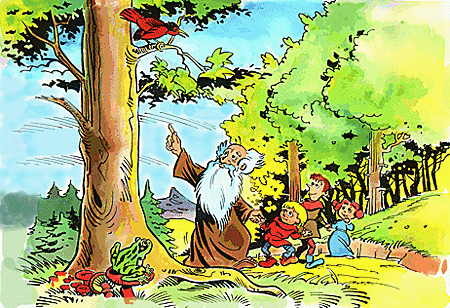Pedo, Paedo Words: “callipedia” to “pedantry”
Part 1 of 2
Words that include: pedo-, paedo-, ped-, paed-, paido-, paid- (Greek: child, boy; infant)
The British tend to use “paed-” while those in the United States tend to use “ped-”. Remember that the Greek ped- means “child” while the Latin ped- means “foot”. Don't confuse this Greek element with another Greek pedo- that means “ground, soil, earth”.
callipedia:
A desire to bear a beautiful child.
cyclopedia, cyclopaedia:
1. The circle of learning; the whole body of arts and sciences.
2. A book containing extensive information on all branches of knowledge, or on all the branches of some particular art, science, etc.; usually arranged alphabetically.
cyclopedic, cyclopaedic:
Pertaining to or of the nature of a cyclopedia.
encyclopedia, encyclopaedia:
[An erroneous form (said to be a false reading) occurring in manuscripts of Quintilian, Pliny, and Galen, for “encyclical education”, the circle of arts and sciences considered by the Greeks as essential to a liberal education]. 1. The circle of learning; a general course of instruction.
2. A literary work containing extensive information on all branches of knowledge, usually arranged in alphabetical order.
3. An elaborate and exhaustive repertory of information on all the branches of some particular art or department of knowledge; especially, one arranged in alphabetical order.
encyclopedian:
1. Embracing the whole circle of learning; comprising a wide range of subjects.
2. Of the nature of or resembling an encyclopedia.
encyclopedic, encyclopaedic:
Of, pertaining to, or resembling an encyclopedia; that aims at embracing all branches of learning; universal in knowledge, very full of information, comprehensive.
encyclopedist:
1. A compiler of or writer in an encyclopedia.
2. One who attempts to deal with every branch of knowledge, or whose studies have a very extensive range.
gymopedium, gymopaedium, gymnopedic:
The distinctive epithet of the dances or other exercises performed by naked boys at public festivals in ancient Greece.
hypnopedia:
The exposure of a sleeping subject to lessons played on a radio, tape recorder, etc.; teaching or learning by this method; sleep-learning.
macropedia:
The main section of the 15th edition of the Encyclopedia Britannica (published in 1974) in which information is presented in the form of extended articles.
micropedia:
A section of the 15th edition of Encyclope>dia Britannica (published in 1974) in which information is presented in a condensed or shortened form.
misopedia:
The hatred of children.
misopedist:
A child hater.
orthopedic:
Relating to or concerned with the cure of deformities in children, or of bodily deformities in general. orthopedic bed, a bed in an orthopedic ward; normally one individually designed to relieve specific skeletal symptoms; more generally, a bed with a very firm mattress or board; also orthopedic bedding, divan, etc.; orthopedic shoe, a shoe designed to ease or correct deformities of the feet; also, orthopedic boot, footwear.
orthopedist:
One who cures deformities; an orthopedic surgeon.
orthopedy, orthopedics:
The curing or correcting of deformities in children, or in persons generally; as with orthopedic surgery.
pancyclopedic:
Of or pertaining to the whole circle of science.
Education today, more than ever before, must see clearly the dual objectives: education for living and educating for making a living.
—James Mason Wood
pedagog, pedagogue:
A teacher of children.
pedagogic, pedagogics, pedagogical:
1. Of, pertaining to, or characteristic of a pedagogue or pedagogy; having the office or character of a pedagogue.
2. The science, art, or principles of pedagogy.
pedagogism, paedagogism, pedagoguism, paedagoguism:
The character, spirit, or office of a pedagogue; the system of pedagogy (teaching).

pedagogue, pedagog:
1. Originally, a man having the oversight of a child or youth; an attendant (or slave) who led a boy to school; (now obsolete, once used exclusively in reference to ancient times).
2. A man whose occupation is the instruction of children or youths; a schoolmaster, teacher, preceptor (now used by some in America and England in a more or less contemptuous or hostile sense, with the implication of pedantry, dogmatism, or severity).
pedagoguette:
A school mistress.
Too often, education is the period during which some are being instructed by those they do not know, about something they do not want to know.
—Rayoa
pedagogy:
1. The function, profession, or practice of a pedagogue; the work or occupation of teaching; the art or science of teaching, pedagogics.
2. Instruction, discipline, training; a means or system of introductory training.
pedant:
1. Formerly, a schoolmaster; a pedagogue; a tutor.
2. One who makes a display or affectation of learning, especially of book learning; also, an erudite person who unduly emphasizes minutiae in the use or presentation of his knowledge; a formalist or precisionist in teaching or scholarship.
3. Someone who makes an excessive or inappropriate display of learning.
4. A person who over emphasizes rules or minor details.
5. Someone who adheres rigidly to book knowledge without regard to common sense.
pedantess:
A female pedant.
pedantic:
Of, pertaining to, characteristic of, or resembling, a pedant; ostentatious of learning; as, a pedantic writer or description.
pedanticism:
Something pedantic; a pedantic idea or expression.
pedantism:
1. The office of a teacher or schoolmaster; also, the state of being under a teacher; pupilage.
2. The ostentatiousness or formalism of a pedant; pedantry.
3. A pedantic action, expression, or trait.
pedantocracy:
The government or sway of pedants; a governing body of pedants.
pedantocrat:
Someone who rules according to a pedantic system
pedantry:
Ostentatiousness, formalism, didactism, or the like, in the presentation or application of knowledge or learning; especially, by a teacher or scholar.